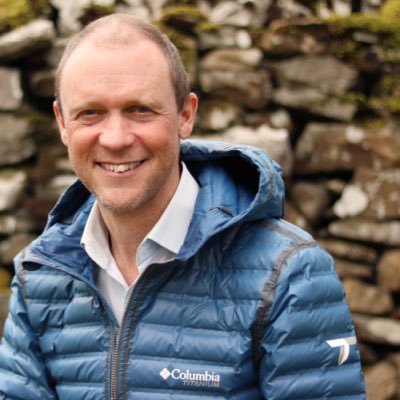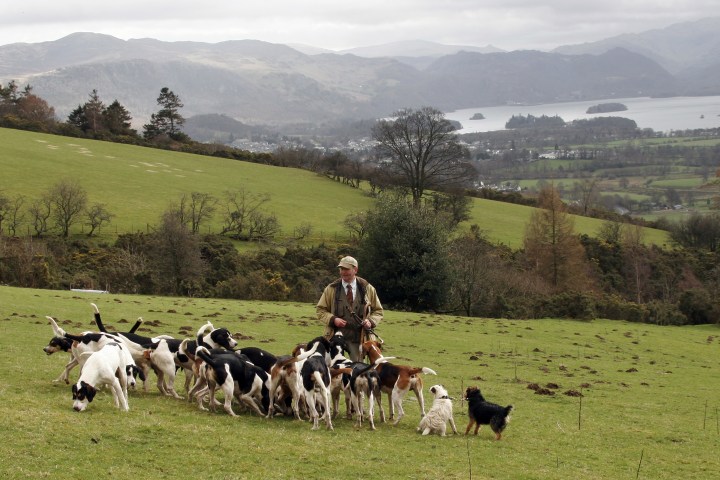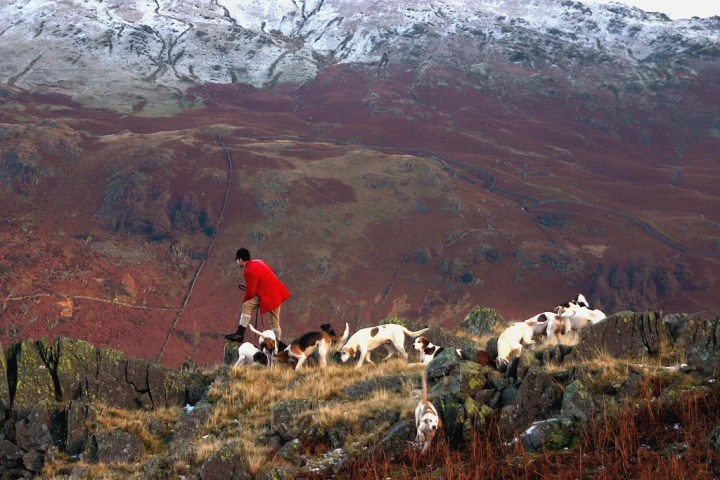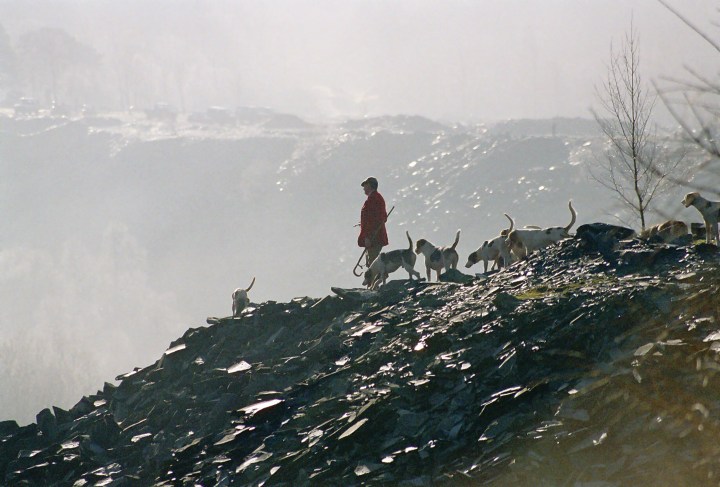palo1
Well-Known Member
I know that only some posters will be interested in the subject matter of the thread and I understand that it is contentious but I wanted to post this article about the way in which decisions have been taken about the LD National Park. Those decisions about a legal activity have been made without consultation, without formal meetings or minutes/records, without evidence of need, without offering any right to reply to any stakeholder and without reference to the official structure of authority relating to the Park organisation. I don't think this is how democracy or a public authority is supposed to work.
BY CAPTAIN ED SWALES
Every rural and hunting Cumbrian certainly does. It’s part of their rural heritage. The famous early 19th century farmer and fell huntsman of the Lake District, lay undisturbed in St Kentigern’s Churchyard in Caldbeck from 1854 until one grim night in 1977, when his grave was desecrated and his remains disinterred by Mike Huskisson, an operative of the League Against Cruel Sports (LACS). Huskisson subsequently served a 6-month jail sentence for that despicable act. I wonder if he learnt the words to the famous song during his confinement.

Richard Leafe
Richard Leafe, the Chief Executive of the Lake District National Park Authority (LDNPA) made an extraordinary decision to ban the legal activity of Trail Hunting on LDNPA land last month. He could neither confirm nor deny to what degree he consulted with LACS in the run up to this decision, as a lot of this interaction had taken the form of verbal briefings, with no minutes recorded.
This startlingly unjust and biased decision had been made without ever once consulting the Central Committee of Fell Packs (CCFP), which represents 8 individual hunts – there was no contact until Wednesday 6th July. The reason for this meeting was to explain why the message that the LDNPA had banned Trail Hunting on its land had leaked to the press, prior to any notification or dialogue with the CCFP.
The CCFP was told by Richard Leafe, during this first ever conversation relating to his decision, that we had ‘reached the end of the road’ and that his office’s inbox was full to bursting with ‘evidence’ of illegal activity.
Staggering.
To put that into context:

UNESCO inscribed the Lake District as a World Heritage site in 2017, under the category of a ‘cultural landscape’, based entirely on the globally unique agro-pastoral land-use system, created by man’s association with hefted Herdwick sheep flocks. The whole look and feel of the Lake District reflect the result of this association between man and nature, with its grazed upland common and fell pastures, stone walls, byres and farm buildings.
Wildlife management in the fells with dogs was always an essential part of livestock rearing, as well as maintaining the numbers of upland breeding and nesting birds. Consequently, Cumbrian fell hunting tradition and its culture is a ‘protected belief’, so unique and strong to this day, despite the efforts of the National Trust (25% land ownership) and Richard Leafe to curtail it. Trail hunting is the cultural living embodiment of this millennial legacy of man hunting with dogs, in this landscape.
Instead of supporting the Cumbrian upland stock farmer, the National Trust, in some back-room agreement with Natural England, United Utilities and the LDNPA, seem to be acting more like the Sheriff of Nottingham. As well as banning their pastime and recreational activity, the NT are behaving like the worst example of tyrannical landlords from the past; dictating farming policy objectives and declining to reissue farm business tenancies with any meaningful length of tenure, instead just rolling them forward, year by year.
They would rather the generational Cumbrian sheep farmer just accepted the cash pay-out, so that the NT could take its property back in hand, replace a family with a manager, de-stock the fells and plant them up with conifer. They can then take all the cash subsidies for both farming and forestry, turn the farms and buildings into holiday lets and glamping pod moonscape and congratulate themselves on a job well done.
This is the most appalling, self-defeating and short-termist behaviour. No other landowner anywhere in UK would get away with treating its tenants like that and quite rightly so. It’s like witnessing the Highland Clearances in reverse. The NT’s motto of ‘For everyone – for ever’ might be rebranded as ‘For everyone who does what we dictate – for as long as we sign your lease’.
‘Yan, tan, tethera, pethera, pip’. No, not a typo; no need for an anxiety attack that your iphone’s packed in. These are the first 4 words of the ancient numbering system of an old Brythonic Celtic language, Cumbric, spoken in Northern England, which had largely died out by the 6th century. Lakeland shepherds still use this language today for counting sheep. The proud, old Regiments of Foot of Westmorland and Cumberland merged to form the Border Regiment, of Arnhem fame. As those gallant Cumbrian men left home, they did so marching to the uplifting tune that reminded them of their beloved fell country, the regimental march, ‘D’ye ken John Peel’. They are also known to have sung it at the relief of the siege of Lucknow, in India in 1857.
Advertisement
And some individual from the LDNPA, with a singularly woke agenda, reckons he’s got a chance of crushing that legacy under the heel of his vegan sneakers?

Beatrix Potter, who left significant landholdings to the National Trust, stipulated in her will that the National Trust must always allow foxhunting to continue on her estates. She was a keen follower of the Coniston hounds, immortalised in her ‘Tale of Jemima Puddleduck’. After the LDNPA meeting, I sat listening to Michael Nicholson, Master and Huntsman of the Coniston, at his farm in Troutbeck, on that very same land. The injustice of the present situation in the Lake District is unacceptable. Next to him, Neil Salisbury, CCFP Secretary, was unsatisfied with the LDNPA outcome and was going in to bat. I could almost hear the lyrics of ‘John Peel’ echoing down the valley:
The CCFP Chairman, an 83-year-old generational Cumbrian farmer whose wife’s family had been Beatrix Potter’s tenants, looked grim-faced but determined to keep the flame of his ancestors alive. This was not going to happen on his watch.

Roger Westmoreland.
The clue’s in the name.
BY CAPTAIN ED SWALES
Every rural and hunting Cumbrian certainly does. It’s part of their rural heritage. The famous early 19th century farmer and fell huntsman of the Lake District, lay undisturbed in St Kentigern’s Churchyard in Caldbeck from 1854 until one grim night in 1977, when his grave was desecrated and his remains disinterred by Mike Huskisson, an operative of the League Against Cruel Sports (LACS). Huskisson subsequently served a 6-month jail sentence for that despicable act. I wonder if he learnt the words to the famous song during his confinement.

Richard Leafe
Richard Leafe, the Chief Executive of the Lake District National Park Authority (LDNPA) made an extraordinary decision to ban the legal activity of Trail Hunting on LDNPA land last month. He could neither confirm nor deny to what degree he consulted with LACS in the run up to this decision, as a lot of this interaction had taken the form of verbal briefings, with no minutes recorded.
This startlingly unjust and biased decision had been made without ever once consulting the Central Committee of Fell Packs (CCFP), which represents 8 individual hunts – there was no contact until Wednesday 6th July. The reason for this meeting was to explain why the message that the LDNPA had banned Trail Hunting on its land had leaked to the press, prior to any notification or dialogue with the CCFP.
The CCFP was told by Richard Leafe, during this first ever conversation relating to his decision, that we had ‘reached the end of the road’ and that his office’s inbox was full to bursting with ‘evidence’ of illegal activity.
Staggering.
To put that into context:
- There have never been any convictions of any hunt in the Lake District.
- Trail Hunting is a perfectly legal activity, recognised as such by DEFRA, which is LDNPA’s higher authority.
- There are no ongoing investigations by Cumbria Police related to any CCFP activity.
- The LDNPA Board has not been involved with Richard Leafe’s decision, apart from in an informal briefing, with no minutes taken. Leafe thought this ‘unnecessary’.
- None of the LDNPA’s received ‘evidence’ has gone forward for prosecution.
- Neither the CCFP nor its individual packs have been presented with any alleged ‘evidence’ of illegal hunting by LDNPA or the Police.
- Several further offers from the CCFP to enter into dialogue on this decision were declined.

Well, it might indeed be the ‘end of the road’ for Richard Leafe, as it appears that a case for Gross Professional Misconduct in Public Office might be appropriate for this apparatchik.
The impression given to the public by this announcement that trail hunting is banned on LDNPA land is that this would extend to cover the Lake District as a whole, as opposed to the 3.9% of it owned by LDNPA. A request for a press release from LDNPA to correct this assumption was made by CCFP. Still no luck with Mr Leafe, who said they would put something on their website instead.UNESCO inscribed the Lake District as a World Heritage site in 2017, under the category of a ‘cultural landscape’, based entirely on the globally unique agro-pastoral land-use system, created by man’s association with hefted Herdwick sheep flocks. The whole look and feel of the Lake District reflect the result of this association between man and nature, with its grazed upland common and fell pastures, stone walls, byres and farm buildings.
Wildlife management in the fells with dogs was always an essential part of livestock rearing, as well as maintaining the numbers of upland breeding and nesting birds. Consequently, Cumbrian fell hunting tradition and its culture is a ‘protected belief’, so unique and strong to this day, despite the efforts of the National Trust (25% land ownership) and Richard Leafe to curtail it. Trail hunting is the cultural living embodiment of this millennial legacy of man hunting with dogs, in this landscape.
Instead of supporting the Cumbrian upland stock farmer, the National Trust, in some back-room agreement with Natural England, United Utilities and the LDNPA, seem to be acting more like the Sheriff of Nottingham. As well as banning their pastime and recreational activity, the NT are behaving like the worst example of tyrannical landlords from the past; dictating farming policy objectives and declining to reissue farm business tenancies with any meaningful length of tenure, instead just rolling them forward, year by year.
They would rather the generational Cumbrian sheep farmer just accepted the cash pay-out, so that the NT could take its property back in hand, replace a family with a manager, de-stock the fells and plant them up with conifer. They can then take all the cash subsidies for both farming and forestry, turn the farms and buildings into holiday lets and glamping pod moonscape and congratulate themselves on a job well done.
This is the most appalling, self-defeating and short-termist behaviour. No other landowner anywhere in UK would get away with treating its tenants like that and quite rightly so. It’s like witnessing the Highland Clearances in reverse. The NT’s motto of ‘For everyone – for ever’ might be rebranded as ‘For everyone who does what we dictate – for as long as we sign your lease’.
‘Yan, tan, tethera, pethera, pip’. No, not a typo; no need for an anxiety attack that your iphone’s packed in. These are the first 4 words of the ancient numbering system of an old Brythonic Celtic language, Cumbric, spoken in Northern England, which had largely died out by the 6th century. Lakeland shepherds still use this language today for counting sheep. The proud, old Regiments of Foot of Westmorland and Cumberland merged to form the Border Regiment, of Arnhem fame. As those gallant Cumbrian men left home, they did so marching to the uplifting tune that reminded them of their beloved fell country, the regimental march, ‘D’ye ken John Peel’. They are also known to have sung it at the relief of the siege of Lucknow, in India in 1857.
Advertisement
And some individual from the LDNPA, with a singularly woke agenda, reckons he’s got a chance of crushing that legacy under the heel of his vegan sneakers?
I doubt it very much; almost as much as I doubt whether UNESCO would endorse the persecution of the rural minority Cumbrian farming community and continue to endorse its ‘cultural landscape’ inscription.
It might end up like Liverpool, being one of only 3 places in nearly 50 years to have its World Heritage status removed. Let’s hope LDNPA, United Utilities and the NT can see some sense and start behaving properly. And if they don’t, we’ll help them.
Beatrix Potter, who left significant landholdings to the National Trust, stipulated in her will that the National Trust must always allow foxhunting to continue on her estates. She was a keen follower of the Coniston hounds, immortalised in her ‘Tale of Jemima Puddleduck’. After the LDNPA meeting, I sat listening to Michael Nicholson, Master and Huntsman of the Coniston, at his farm in Troutbeck, on that very same land. The injustice of the present situation in the Lake District is unacceptable. Next to him, Neil Salisbury, CCFP Secretary, was unsatisfied with the LDNPA outcome and was going in to bat. I could almost hear the lyrics of ‘John Peel’ echoing down the valley:
“Then here’s to John Peel with my heart and soul,
Come fill – fill to him another strong bowl
And we’ll follow John Peel through fair and through foul
While we’re waked by his horn in the morning”
Come fill – fill to him another strong bowl
And we’ll follow John Peel through fair and through foul
While we’re waked by his horn in the morning”
The CCFP Chairman, an 83-year-old generational Cumbrian farmer whose wife’s family had been Beatrix Potter’s tenants, looked grim-faced but determined to keep the flame of his ancestors alive. This was not going to happen on his watch.

Roger Westmoreland.
The clue’s in the name.
